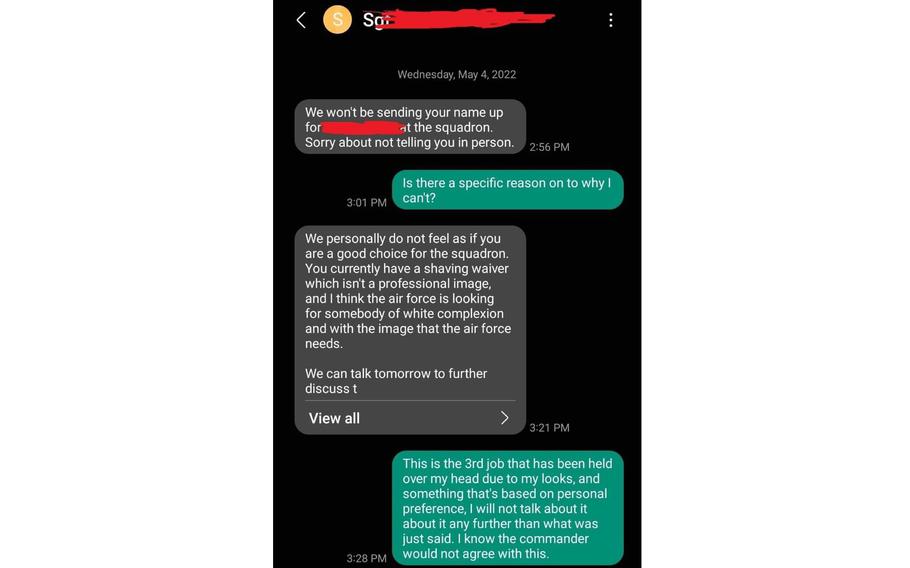
The 56th Fighter Wing at Luke Air Force Base, Ariz., is investigating after a photo of a text message conversation was posted May 4 on Facebook that showed an airman might have been discriminated against because he is Black and has a shaving waiver. (Photo from Facebook)
Officials at Luke Air Force Base, Ariz., are investigating a claim made by an airman that he was denied a job because he is Black with a medical waiver to forgo shaving daily.
The 56th Fighter Wing at the base said the unit initiated the investigation after a photo of a text message conversation between the airman seeking a job and another airman was posted May 4 to a Facebook page popular with Air Force members known as “Air Force amn/nco/snco.”
“We won’t be sending your name up,” one airman wrote to the other. “We personally do not feel as if you are a good choice for the squadron. You currently have a shaving waiver which isn’t a professional image, and I think the Air Force is looking for somebody of white complexion and with the image that the Air Force needs.”
The Black airman, who has been selected for promotion to noncommissioned officer, had applied to work as the unit’s fitness assessment cell, which conducts and oversees physical fitness tests, according to a source close to the situation who spoke on condition of anonymity.
The airman responded to the job denial by saying it’s the third time a job “has been held over my head due to my looks, and something that’s based on personal preference.”
The statement released by Luke Air Force Base did not verify the conversation took place.
“Without going into specifics of the investigation, we can categorically say that Luke airmen are held to a high standard of conduct and that we maintain a zero-tolerance policy regarding acts of discrimination based on race,” the base said.
This investigation comes nearly two years into the efforts by the Air Force to improve inclusion and diversity among troops. A December 2020 report from the Air Force inspector general confirmed racial disparity exists for Black service members when it comes to leadership opportunities and professional military education development, among other areas of service. Missing those opportunities can hold back members from career advancement.
The report also said Black service members have reported being a target for discrimination because of their personal appearance, including hair and grooming standards, such as shaving.
“Under this question, survey participants indicated they experienced discrimination primarily from their immediate supervisors and/or leadership. For example, members described being assigned extra work, picked on, harassed, isolated, or humiliated based on their race,” according to the report.
As recommended by the report, the service established the Office of Diversity and Inclusion in January 2021 to address the problems it identified.
Waivers to forgo daily shaving are more common for Black men in the military because they are more likely to have a skin condition called pseudofolliculitis barbae, or PFB, according to a study in Military Medicine, a peer-reviewed medical journal.
Those with the condition can experience painful bumps and scarring on their neck and face when repeatedly shaving close to the skin. It typically doesn’t respond to topical medications or different shaving techniques, according to the study. It’s most effectively treated by allowing the hair to grow long enough to curl away from the skin.
The American Osteopathic College of Dermatology estimates up to 60% of Black men suffer from PFB.
In 2020, the Air Force approved a five-year medical waiver that allows for short facial hair growth. The Military Medicine study found, anecdotally, the waiver has been used to exclude airmen from serving as recruiters, basic training instructors and members of the Thunderbird demonstration team.
“Male beard growth beyond that allowed by [U.S. Air Force] regulation can cast members in a negative light as it can be considered unprofessional,” according to the study.
The study also found an association between shaving waivers and delayed promotions.